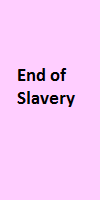 | ||
 |
> Research | > Progress |
History of Social Progress
The chart below illustrates a history of social progress beginning in ancient times. Because the pace of changed has quickened, recent centuries are shown in greater detail. Click on any titled section of the chart to see a related web site, which shows more information about how the progress originated.
Social progress is not continuous. There have been times of significant improvements and times where progress seems to have reversed. Also, some parts of the world lag behind others (even today, where some nations still suffer in poverty and strife). This makes it very difficult to characterise any era as having typical levels of progress. The chart below shows the "high points" of progress, where improvements have been made that people enjoyed in many parts of the world, but not necessarily everywhere.
Each topical area is represented as a vertical slice. The colour saturation in a vertical band increases as the progress becomes more effective at improving the survival and happiness of a population.
It's hard to give an overview of all human history on a single panel! Different authors might attempt it and choose different things to highlight. Because this is a site about human behavior, and the consequences to societies of choosing different kinds of behaviors, that is of particular interest to this author. Gradually over history there have been changes in societal choices, such as whether nations shall educate their children, whether to hold leaders accountable to the citizens (and how), whether slavery is permitted, etc.
Many of these changes in behavior have become possible because of discoveries in other domains. For example, democracy does not become practical until there is a means of distributing information (starting with the invention of the printing press, and later other means of communication). Therefore, a few enabling inventions are also shown on the above chart.
It has been said of history that "the only thing we learn from history is that people never learn from history." I think it is aparent from the chart that is not quite true, because clearly there have been improvements. However, as I prepared the chart and picked some various web sites that are referenced by clicking it, I was quite impressed with how far back in time progress began on matters such as public education, democracy, etc. There have been very attrocious behavior too over much of history, but gradually improvements have arisen. What has really accellerated things in the modern world are our better ways of communicating and disseminating knowledge, so that successful strategies can be adopted more widely.
Nevertheless, our world still has nations where people suffer from poverty, war,
ignorance, and other problems for which solutions have existed since long ago.
To see a picture of how different countries rate on social progress, check out
this web site:
Social Progress Index
Let's hope that the 21st century will be one in which those problems are finally solved planet wide (and beyond our planet too, as people may gradually venture out into space)!
What do you think of the content on this web page?
| Site Search | |
Return to Universal Ethics home page |































